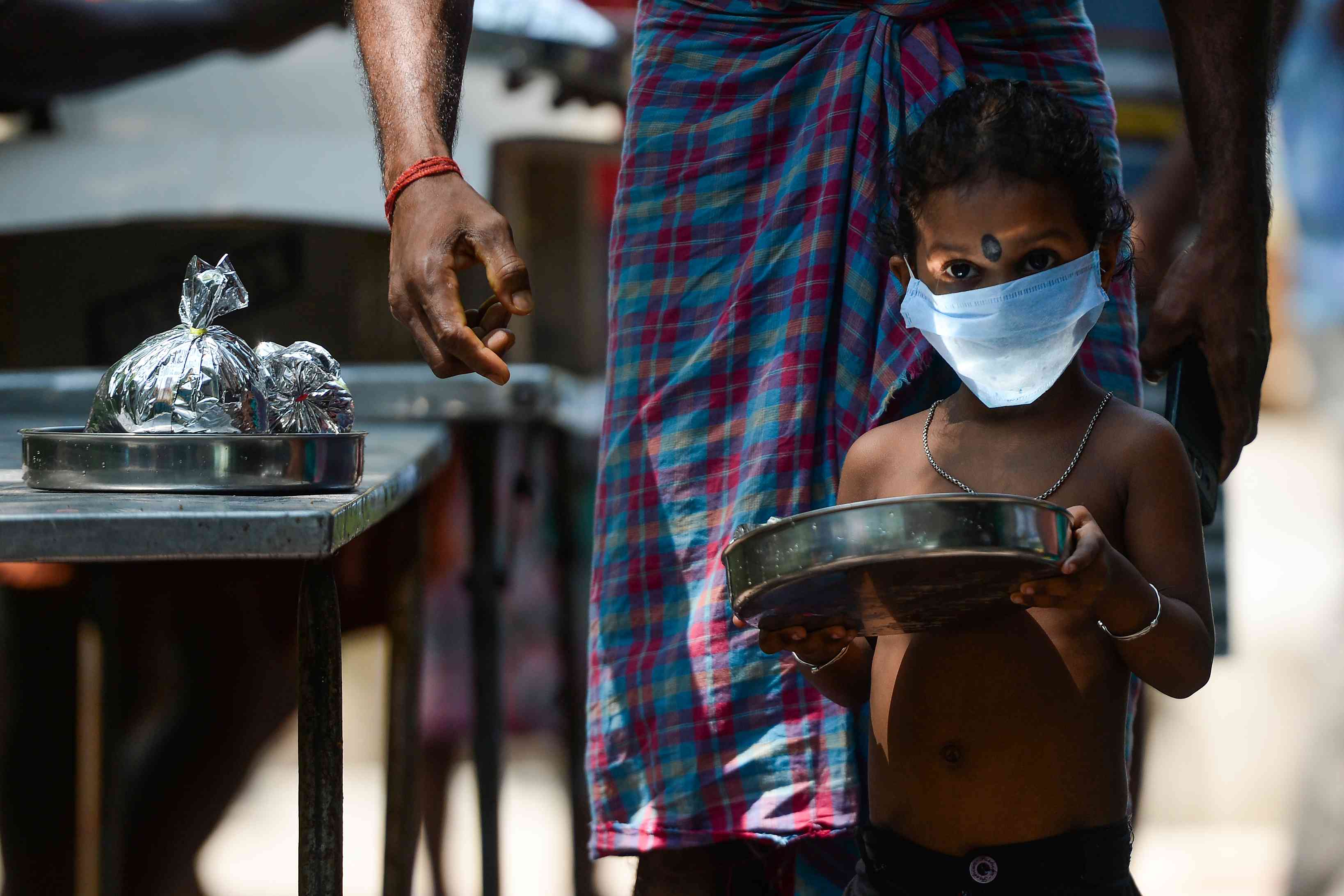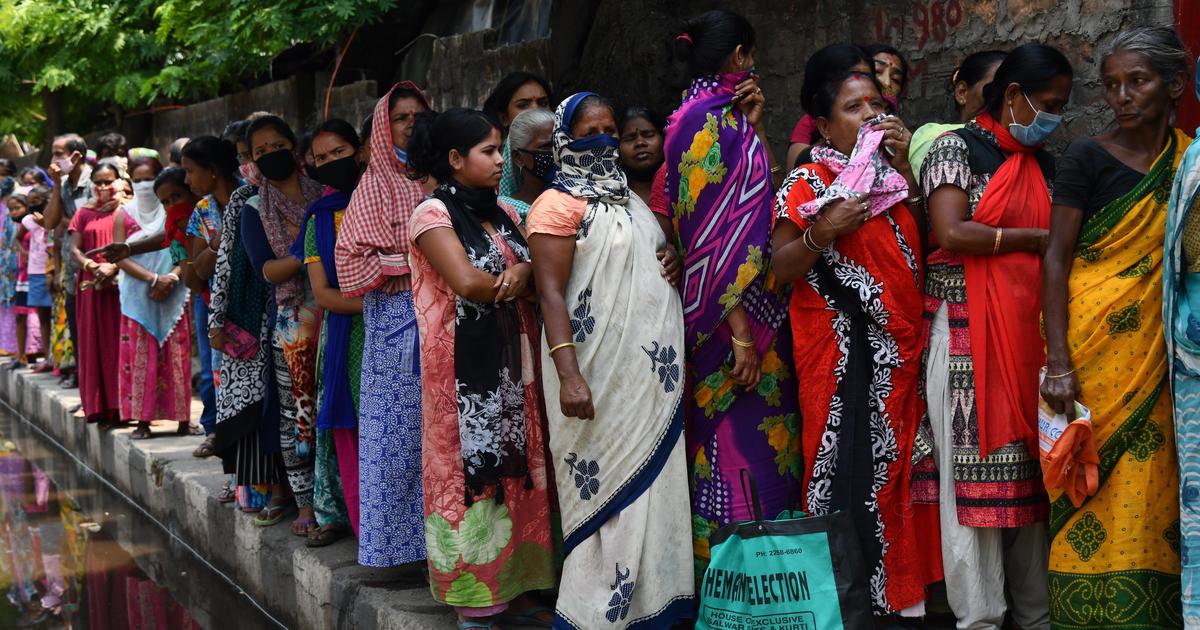On April 11, one of our young colleagues at the Karwan-e-Mohabbat visited his village in Dhanbanda, in Assam’s Barpeta district, to distribute coupons that would enable vulnerable families to buy essential items from grocery stores. To maintain physical distancing and lockdown rules, our colleagues are deploying this strategy across Assam.
The colleague in question went to meet Shajahan Ali at his rented house, surrounded by green paddy fields, where he lives with his wife and their 13-year-old daughter. Shajahan wasn’t home.
His wife Mafida, who was pregnant at the time, said they had faced a lot of difficulties over the previous week. “We have no option,” she said. “I pick green chillies from the fields, dig up garlic, mash them together and eat it with rice. We are barely keeping ourselves alive.”
Shortly after, she gave birth to a son, who died within a week.
No social security
Shajahan works as a mason in Barpeta. His income allows him to pay the house rent, pay his daughter’s school fees, buy medicines and food for the family. However, the Covid-19 and the sudden lockdown came as rude shock. The contractor could not pay his wage for a month due to the lockdown. “No one can’t go out on the streets,” said Mafida. “The police beat people up.”
According to an advisory issued by Union Minister of State Santosh Kumar Gangwar, Shajahan should have received Rs 1,000 through the Building and Other Construction Workers Welfare Board. In Assam there are an estimated 10 lakh construction workers, of which approximately 7% are registered with the board.
To avail of the benefits, workers need to send their registration card and bank details to the authorities. Shajahan is not registered with the board. However, Barpeta-based labour rights activist Faruk Ahmed said that many registered construction workers had not gotten the benefit either.
Another activist Faruk Khan said there are more than 50,000 construction workers in the district out of which hardly 1,000 to 15,000 workers have received the money.
Over the years, Assam Building and Construction Workers Welfare Board has collected cess of Rs 454 crore and have spent only Rs 7 crore on the welfare of workers. News reports alleged that the board’s top officials siphoned off Rs 121 crore.
A life of struggles
Shajahan Ali originally belongs to Dharmapur char, a river island on the Brahmaputra in Southern Barpeta. In Assam, there are more than 2,200 char villages, which accommodate nearly 10% of Assam’s total population. These are temporary land mass formed out of sand, silt and debris, carried by the flood water and susceptible to erosion in the perennial floods.
Shajahan’s parents were prosperous farmers here – they grew rice, jute, pulses and vegetables. He spent part of his childhood herding cattle in the char, until his home and 30 bighas – around four hectares – of agricultural land got submerged by a flood. This is a common occurrence in the region, affecting millions of people, especially Bengal-origin Assamese Muslims, who hardly get sympathy from the state’s ruling dispensation.
Shajahan’s family took shelter in a place nearby from where he was trafficked to Dimapur in Nagaland and engaged in a brick kiln. As a teenager, he worked in a brick kiln and other hazardous sites as a bonded labourer for five years. He fled to Barpeta 14 years ago, where he became a helper on a construction site. He then started working as a mason, married Mafida and started living in a rented house.

No place called home
On paper, Shajahan’s address is still listed as the submerged land in Dharmapur. This includes his name in the National Register of Citizens and the electoral list. However, when he tried to get a ration card on that address, he couldn’t.
He has no idea when the land will reemerge, but continues to pay revenue on it. “If I don’t pay the revenue, the government will take my land rights,” he said over the phone. Meanwhile, the government is yet to announce any compensation or protective measures for victims of river bank erosion and other internally displaced persons.
Mafida too is registered as a voter as per her parent’s address. She was denied a ration card as well, owing to discrepancies in the photographs. “We do not have our own ration card,” she said. “We buy rations throughout the year. If we can buy ration, we eat. If not, we don’t eat.”
Though she has a bank account and heard that government will deposit Rs 500, her account is dormant “I have an account,” she said. “I couldn’t keep it active because I didn’t have money to save. So no money has entered my account.”
Mafida also alleged that while others received benefits under the Prime Minister Awas Yojna, Swachh Bharat Mission, and flood relief measures, they got nothing. Since Shajahan is only a tenant and can’t vote in the village, the panchayat representative does not pay heed to their challenges. The panchayat has distributed Rs 1,000 among few poor families who do not have ration card. “I could have [had] provisions for some days if I were chosen,” she said.
Counting down the days
Amid the lockdown, Mafida gave birth to a baby boy at the Fakhruddin Ali Ahmed Medical College and Hospital. After the birth of their daughter, she had previously given birth to two sons, who both died within a week. The couple had told the doctor about her history. But they were told that their newborn son was fine and released from the hospital the next day.
However, the baby soon fell ill. “[On the] first two days, the baby was fine. However, third day onwards, the baby was crying and [started having seizures].” Due to the lockdown, the couple could not even think of admitting the boy to a hospital. On the fourth day, the boy died.
Over the phone, Shajahan told us that Mafida is traumatised and ill. He had managed to get her some medicines from the village quack. He said he cannot fathom why such terrible things are happening to his family and how they will survive the lockdown.
Read other articles in Karwan e Mohabbat’s Lockdown Crisis series here.
